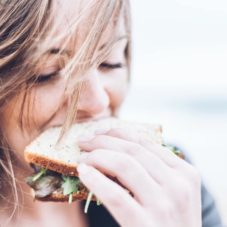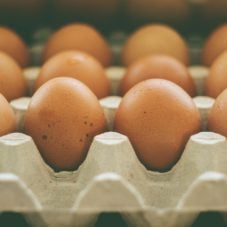Nutrition
Practical Weight Loss Tips For Women: Avoid These 9 Mistakes!
For a lot of women, losing weight seems to be a never-ending battle. Diets never seem to work and exercising literally takes the very breath out of you. It doesn’t help as well when you see men losing weight faster than women. In this article, we’ll cover several weight loss tips for women that will help you achieve – and keep – your target weight faster!
Table of Contents
Is it really harder for women to lose weight than men?
Unfortunately, yes. There are physiological reasons for this. For instance, men have higher resting metabolic rates (RMR) than women. This was confirmed in a study that examined 328 men and 194 women. The men’s RMR was 23% higher than women, which means that even when at rest, men’s bodies were burning more calories than women (1).
Another thing is that men also tend to focus more on things like fitness and muscle-building. On the other hand, most women simply want to lose fat. This isn’t necessarily bad, ladies! However, strictly aiming for shedding fat at all costs can easily cause you to make certain mistakes that may ultimately sabotage you from dropping those pounds.

9 Weight Loss Tips For Women You Can Apply ASAP!
Let’s take a look at some of the most common traps women tend to fall into when it comes to weight loss.
1. Fad diets, crash diets, & “diet” foods – oh my!
These days, it’s impossible to flip through social media feeds or turn on the TV without seeing some type of advertisement for a weight loss program or diet. Do you ever feel like their claims are too good to be true? Most of the time, you are exactly right! Can they allow you to drop a significant amount of weight within a few weeks? Sometimes, but you’re almost guaranteed that the weight will come right back once you finish the diet.
Fad diets are nothing but a short-term fix
Fad and crash diet trends and programs are simply short-term fixes to drop weight quickly, which means they are typically not sustainable long-term (2). If you’re simply trying to lose a few pounds to look good at a special event, this quick fix might be perfect for you. For everyone else trying to keep the weight off long-term, hard pass!
Some weight loss programs require you to purchase their special foods. Sure, this sounds like a convenient way to lose weight, especially for the busy ladies out there! In fact, you may very likely lose weight on these programs. But just like fad diets, the instant you have to go back to your usual routine, the weight comes right back on.
Diet companies aren’t stupid – they know this cycle! Ultimately, they want you to gain weight back so you will pay to return to their program and once again line their pockets.
In general, any diet that requires you to pay for access to their plan or food is a money-making gimmick, and any diet that sounds too good to be true usually is. Shedding 10 pounds in a week is not humanly possible, nor is spot-reducing your belly fat! In the end, most of these programs are unrealistic to stick to long-term.
Beware of ‘diet’ food products in the grocery
If you’re avoiding fad and commercial diets and sticking to the grocery store, you’re good to go, right? Not so fast! Diet foods are lurking in every aisle. Grocery stores are overflowing with foods that claim to be better for you such as fat-free, low-calorie, and reduced-sugar items.
While these foods can be helpful for people actively trying to reduce their fat or sugar intake, taking something out of a food (such as fat) means something else has to be added to replace it. Often, that “something else” is sugar in order to keep the food’s taste appealing.
In the end, “healthier” junk food is still junk food. You’re better off sticking to the basics – fresh, nutritious foods.
Instead of dieting, change your lifestyle instead
Rather than turning to crash or fad diets, just try to make small, permanent changes in your lifestyle. Eating nutritious foods, getting into a workout routine, and taking care of your health can go a long way when it comes to weight loss. By following this weight loss tip, your wallet will be happier, you won’t have to starve yourself to get results, and your weight loss will be more sustainable.

2. Attaching emotions to food
We’ve all been there. The movie cliché of a woman eating a tub of ice cream while crying in a bubble bath isn’t that far off from the truth some days. People of both sexes often turn to comfort foods to avoid dealing with emotions.
Stressed out? Munch on bars of chocolate! A break-up? Better pick up some cookies.
We stress-eat things like baked goods, ice cream, and chocolate, believing that it will fill some kind of emotional void inside us and make us feel better.
In reality, there’s actually quite a bit of truth to this belief. It comes down to 2 neurotransmitters (brain chemicals) – serotonin and dopamine.
Serotonin
Serotonin is often called the “happy” or “feel-good” neurotransmitter, as it regulates our mood. High serotonin levels are associated with happiness and feeling content, while low serotonin often leads to depression (3).
So, what does serotonin have to do with the pint of ice cream you just stress-devoured? Serotonin is released in response to consuming food – particularly sugar and other carbohydrates.
On a molecular basis, comfort foods really do make us feel better for a little while. However, once you get into the habit of comfort eating every time you feel stressed or down, the harder it is to stop doing it, which of course leads to weight gain.
Dopamine
Dopamine, meanwhile, is part of what’s known as the dopamine reward pathway. This pathway essentially takes note of a pleasurable experience (in this case, overeating comfort food), making you crave this experience in the future (3).
If this happens too often, brain cells become less responsive to dopamine, and you’ll progressively need more and more dopamine to get the same feeling. This is exactly how many drug addictions develop, as well as why many people struggle with binge eating and other disordered behaviors.
Change the way you think about food
So, here’s our weight loss tip for women. A big part of weight loss is changing the way you think. Letting go of eating emotionally requires a significant change in how you see yourself, your ability to lose weight, and food. Learning to view food simply as fuel for your body rather than a way to numb your feelings is a key habit for being successful in weight loss.

3. Cutting out too much fat
A few decades ago, everyone believed that fat was the cause of weight gain. Many women still specifically seek out fat-free and reduced-fat food options at the grocery store when they are aiming for weight loss.
Now, if you have certain health conditions, reducing your fat intake may be your only option. But is fat inherently “bad” for weight loss?
Absolutely not! Your body needs dietary fat for many of its important functions, such as storing energy, building cell membranes, and controlling the absorption of fat-soluble vitamins (4).
Most nutrition experts agree that adults should consume around 20 to 35% of their calories from fat, so there is no need to only allow yourself a tiny amount of fat each day (4). Cutting yourself too short on fat can lead to all kinds of problems such as essential fatty acid and fat-soluble vitamin deficiencies.
Not all fat is created equal, though. Saturated fat should be limited to about 7% of your daily calories, and trans fats should be avoided whenever possible (5). Other types of fat – such as unsaturated, essential (required but not made by your body), and omega-3 fatty acids – are actually beneficial for your health. As with everything else, fat should be consumed with moderation for optimal health.
4. Cutting carbs
As with fats, carbohydrates have been shunned recently. Cutting out carbs can result in rapid weight loss, but this is typically only “water weight” that returns once you add carbs back into your diet.
Additionally, restricting carbs can lengthen weight loss “plateaus” and stall your weight loss. Our brains are chemically wired to crave carbs – since glucose is their preferred energy source! When you deprive yourself of carbs, you’re more likely to crave the high-carbohydrate foods you’re missing out on.
Carb quality matters
For this weight loss tip, instead of drastically reducing your carb intake, focus on the type and quality of carbs you consume. Different types of carbs have different effects on your body.
Simple carbs (such as those found in foods like pasta, cereal, and baked goods) are metabolized quickly for energy or destined for fat storage if consumed in excess.
On the other hand, you can consider complex carbs as your secret weight-loss weapon. Complex carbs are found in whole grains, vegetables, and fruits, and they are metabolized much slower thanks to a little bit of extra fiber (5).
If you simply cannot live without bread, try substituting wheat or whole-grain bread instead of white. Craving a cupcake when your sweet tooth hits? Grab a piece of fresh fruit. Choosing your carbs carefully is more effective for weight loss than simply depriving yourself of all carbs.
Related article: Low Carb vs Keto: Which Is Better & More Sustainable?

5. Skimping on protein
When it comes to weight loss, protein is absolutely vital for success, but many women don’t include enough of it in their diets. Weight loss comes with muscle loss if you don’t structure your diet properly, and fat loss isn’t as efficient without proper protein intake. Adding high-protein foods into your diet can help to prevent muscle loss and may help you stay away from stubborn weight plateaus.
Some of the most popular protein sources include meat, fish, and eggs. However, if you’re vegetarian or vegan, there’s no need to miss out on protein. Plant-based sources such as tofu, edamame, lentils, and chickpeas are chock-full of quality protein. If you don’t like any of these options, protein bars, shakes, and even cookies are available. Protein is clutch for weight loss, helping you to stay full longer.
The proper protein ratio
Of course, keep your protein intake to a moderate amount. Adult women only require 10 to 35% of their calorie intake from protein to keep their bodies working properly (5).
If you exceed that amount on a regular basis – just like any other nutrient, protein that doesn’t have a use will be ultimately stored as fat. When it comes to weight loss, keeping an eye on your protein intake and making sure you’re falling in that 10 to 35% range is vital to make sure that you’re fueling your body properly.
6. Obsessing about calories
The number-one rule of weight loss is “calories in, calories out”, simply burning more calories than you consume. This means that limiting your calorie intake is a necessary evil when it comes to losing weight. However, the quality of the calories is just as important as the amount.
Ever hear someone being referred to as “skinny-fat”? If you’re sticking to your calorie goal but only eating complete garbage, your weight loss will not be as beneficial to your health compared to the same number of calories from complex carbs, proteins, and healthy fats. Not making nutritious choices can cause issues such as blood sugar fluctuations, low energy, and generally feeling lousy.
Choose good over empty calories
Using most of your daily calories on nutritious foods such as fruit, vegetables, whole grains, and lean meats will serve you better in the long run. However, don’t be afraid to allow small indulgences occasionally.
If you have a sweet tooth, don’t try to shut it down – you’ll most likely end up with cravings and a downward food spiral! Figure out how to fit a small portion of a favorite treat into your calorie goal, and truly enjoy it rather than feeling guilty!

7. Avoiding the weight room
For our 7th weight loss tip for women, let’s talk about a common misconception. Many seem to think that if they do strength training, they will end up looking like a muscle-bound, unfeminine bodybuilder and lose all their favorite curves. This is certainly something you do NOT need to worry about when it comes to exercise. Yes, some women manage to achieve the classic bodybuilder physique, but this never happens by accident.
Women do not have high enough testosterone levels to achieve this massive muscle growth (6). The rare extremely-sculpted female bodybuilder built her physique by bulking, cutting, seriously intense gym sessions, and (most of the time) taking anabolic steroids. Rest easy, simple weight training will not even come close to this extreme for the average woman.
What weight training can do for you
Weight training can actually help you to accentuate your curves. Rather than losing muscle as you lose weight, weight training allows you to retain your existing muscle tissue and build it up.
With proper exercise routines and a balanced diet, you can actually begin to have some control over where your curves are, essentially allowing you to “build” the body of your dreams.
Another bonus of weight training – building muscle can also help you to shed fat. Muscle tissue requires more energy than other tissues (particularly fat), so more muscle can boost your calorie burn, even at rest.
Avoiding weight training will only slow your weight loss and make it more difficult for you to keep the weight off. If it’s stepping into the weight room that makes you anxious, find a friend to come with you, or hire a trainer for a day or two if it’s in your budget. Everyone will not stop what they’re doing and stare at you, I promise!
8. Meal skipping and over-restricting
Food is not the enemy! You literally need food every day of your life to keep yourself alive. Of course, we as humans like to make things complicated. If you tend to skip meals, you’re only setting yourself up for trouble later in the day.
Eventually, those hunger pangs will catch up with you and cause you to grab the fastest, tastiest, largest amount of food you can find. This can mean succumbing to a late-night binge, hopping in the car for some fast food, or simply eating a WAY larger meal than necessary.
Similarly, if you have a habit of trying to repent for a “bad” day by restricting your food the next day, chances are that you’ll fall right back into your habits from the day before. Don’t make it more complicated than it needs to be.
What to do instead?
Simply eating three balanced meals a day (or more, if you prefer smaller meals) is more effective for weight loss than cutting yourself too short on calories or skipping meals entirely.
If you constantly consume more than your body needs to go about its daily functions, you’ll find that this sabotages your progress on the scale.
At the other extreme, it’s equally important not to overeat, finding a healthy balance between the two can be tricky, but it’s worth it in the long run.

9. The biggest mistake of all: Seeing the scale as the only measurement of your progress.
You’ve been counting your calories, working out, and sticking to your new diet like a champ for a week. You jump on the scale, hoping to see an impressive loss. After all of your hard work, it should be a significant difference, right? Today is not that day.
You step on the scale with the highest expectations in the world, only to feel completely deflated when you barely lost anything, didn’t budge an ounce, or even gained weight. This is the point where many women throw in the towel, give up, and make arguably the biggest weight loss mistake.
Weight loss isn’t always a straight line. While they are incredibly frustrating and make you want to rip your hair out, constant fluctuations on the scale are COMPLETELY normal! There’s nothing wrong with you, your scale isn’t broken, and you didn’t gain 3 pounds overnight from that extra slice of pizza.
Factors such as sodium intake, the weather, exercise, hydration, and even hormones can cause your weight to flip-flop all over the place for no apparent reason. Most of the time, it’s not your fault! The human body is a very intricate machine that likes to play tricks on us sometimes.
Take control back from the weighing scale!
Don’t allow it to define your self-worth, mood, or make you feel like you’re doing something wrong. If you feel like weighing yourself every day is a major source of stress, maybe switch to visiting your scale once a week.
In the meantime, eat well and be active. Not dropping a ton of weight at the beginning of a diet does not mean you’re failing or that you can’t lose weight. Focus your energy on improving your lifestyle and you’ll likely find that you have more success with weight loss.
Our final weight loss advice for women (and men too)
Don’t be so hard on yourself if you fail to meet your target weight by your ‘deadline.’ Losing weight is a marathon, not a race. Don’t look at how others are faring – we all have our own journeys. Instead, look back at how far you’ve come. Celebrate every milestone reached – you certainly deserve it!
References
(1) Arciero, P J et al. “Resting metabolic rate is lower in women than in men.” Journal of applied physiology (Bethesda, Md. : 1985) vol. 75,6 (1993): 2514-20. doi:10.1152/jappl.1993.75.6.2514
(2) Khawandanah, Jomana & Tewfik, Ihab. (2016). Fad Diets: Lifestyle Promises and Health Challenges. Journal of Food Research. 5. 80. 10.5539/jfr.v5n6p80.
(3) Singh, Minati. “Mood, food, and obesity.” Frontiers in psychology vol. 5 925. 1 Sep. 2014, doi:10.3389/fpsyg.2014.00925
(4) Liu, Ann G et al. “A healthy approach to dietary fats: understanding the science and taking action to reduce consumer confusion.” Nutrition journal vol. 16,1 53. 30 Aug. 2017, doi:10.1186/s12937-017-0271-4
(5) United States Department of Agriculture. (n.d.). Dietary reference intakes: Macronutrients.
(6) van Anders, Sari M et al. “Effects of gendered behavior on testosterone in women and men.” Proceedings of the National Academy of Sciences of the United States of America vol. 112,45 (2015): 13805-10. doi:10.1073/pnas.1509591112





